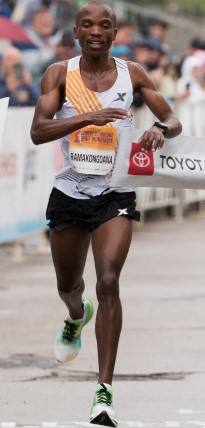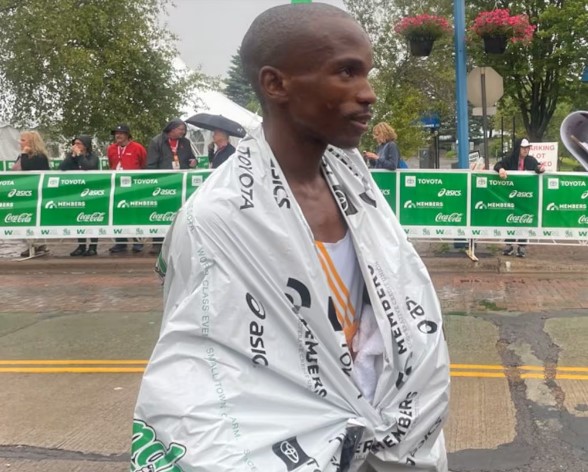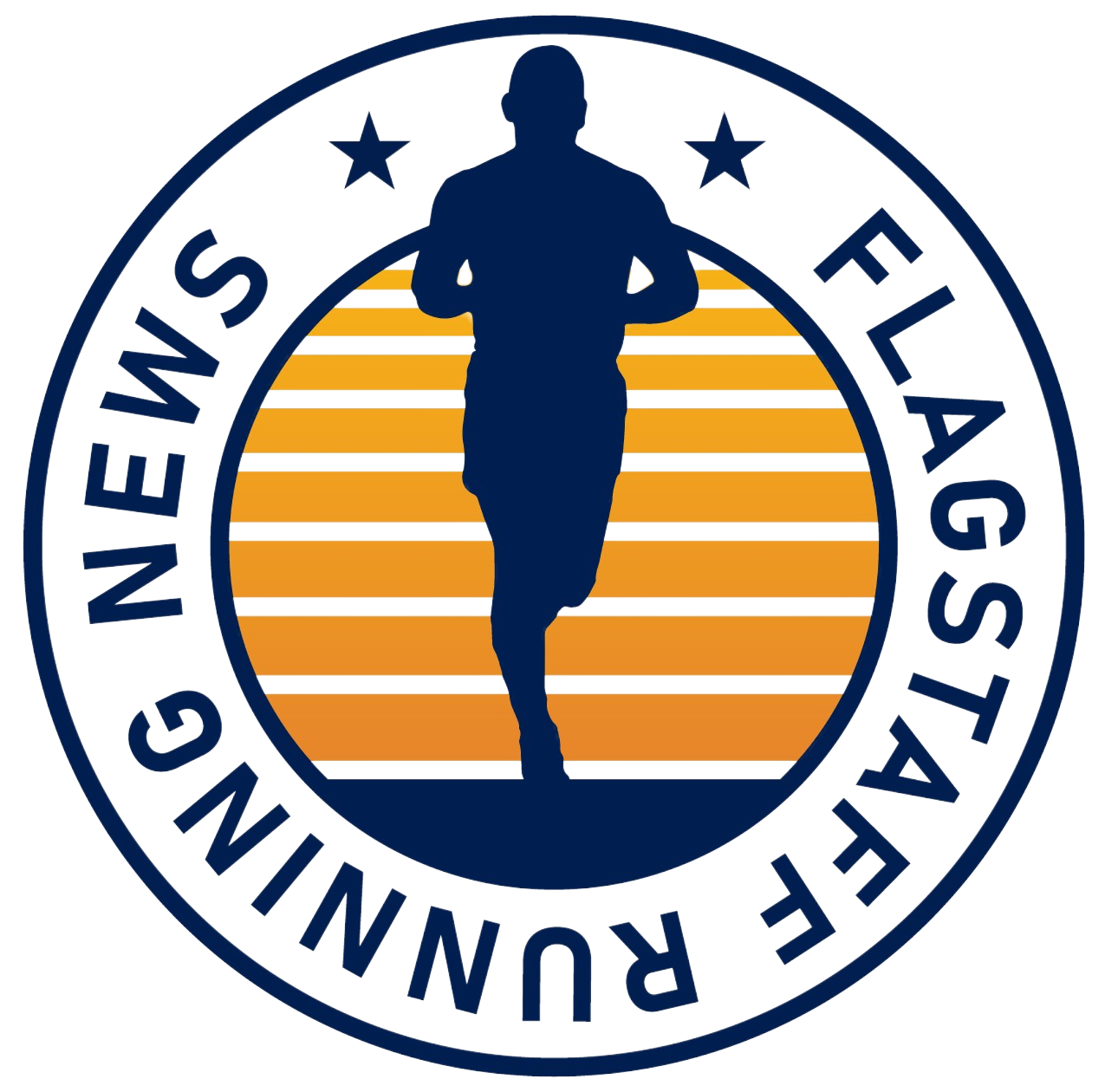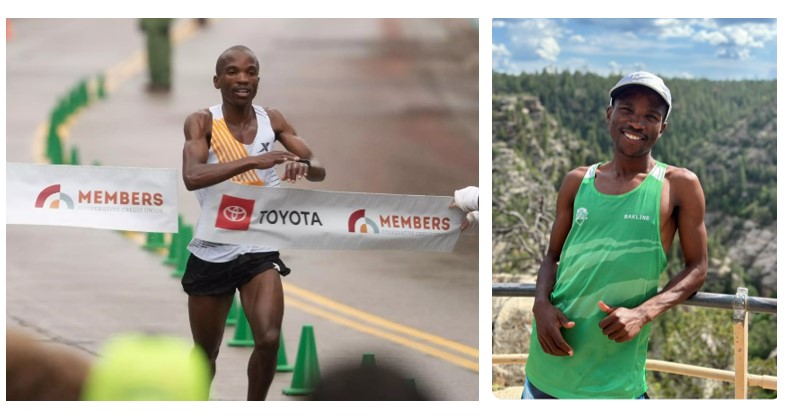Perspective is everything, yes, and everything is relative. So it’s not a criticism, merely an observation based on experience, when Lesotho elite marathoner Tebello Ramakongoana gives the following response when asked about Flagstaff, where he has spent four months training for the Paris Olympics:
“Flagstaff is not that hilly.”
No diss meant and, hopefully, none taken. You just have to know where Ramakongoana is coming from. That place is the Qacha’s Nek district in Lesotho, the tiny mountain kingdom surrounded entirely by South Africa.
And though Ramakongoana’s town sits at 6,500 feet, slightly lower elevation than Flagstaff and boasting a similar clime, little there is flat – or paved. Steep elevation gains are the norm, and while the neighborhood’s highest mountain is only slightly higher than our Mount Elden, there are – wait for it – 44 peaks in the surrounding area.
Even if Ramakongoana wanted to do flat runs at home, good luck finding them.
So, given that Qacha’s Nek has high altitude and hills, what compelled Ramakongoana to train in Flagstaff for his final build-up to Paris, where he will be Lesotho’s flag bearer in Friday’s Opening Ceremonies?
Simple. It’s winter in Lesotho now and, frankly, cold as hell. Qacha’s Nek may not get as much snow as Flagstaff, but let’s just say in the winter it’s not the ideal climate for heavy training for an Olympic marathon that promises to be hot and humid.
Because Ramakongoana is coached by James McKirdy – stay tuned for the wild story of how the two hooked up – of the eponymous training group based in Flagstaff, our mountain town seemed the logical choice. That meant leaving his wife and 1-year-old son for four months – “It has affected me mentally,” he conceded – for an extended training camp.
And Ramakongoana, 27, soft spoken but with an engaging smile that would light up the Eiffel Tower, said he enjoyed his time here training with other elite distance runners for the first time in his burgeoning career. Just don’t expect him to gawk and moan about our thin air and (we think) big climbs, as other elites parachuting in for training often do.
The man just shrugs.
“A lot more mountains at home,” he said, munching corn-on-the-cob at McKirdy’s home a few days before the two left for Paris. “Do I want (a) flat run? No, no. Maybe. But no. A flat course is not a test. I like the hills. I like a test.
“(Being born at altitude) helps me a lot. When I go to sea level, I don’t feel that much harder. I think to grow up there (in Lesotho) is a blessing. You can see some other athletes, they struggle a lot, especially on hills. They struggle on downhills, too. For me, downhill, uphill, they are the same for me.”
But not everybody responds to altitude – or hills – even those who have known nothing else. Ramakongoana, though, thrives on it, which should help him on the Paris marathon course, which features 1,200 feet of elevation gain. It’s hardly steep, compared to mountain trail running, but for elites in super shoes mostly accustomed to pancake-flat courses, it’s a challenge.
“The hills will be the part of the race I will enjoy,” Ramakongoana said, shooting a glance at McKirdy in the kitchen and then smiling broadly.
Ramakongoana does not concern himself much with Strava and comparing his times, mileage and climbs to others, but McKirdy is aware of just how much work his runner has logged from mid-March to mid-July.
It is impressive.
“I did the math and in terms of climbing in this segment, it’s been around 67,000 feet, maybe close to 70,000,” McKirdy said. “Not as much as (Canadian Olympian Rory Linkletter, a Flagstaff resident) but still a significant amount. In terms of Flagstaff numbers, well, I’ve kind of shielded Tebello from Strava and what all that means, but even though I don’t like to compare, metrics can give me an idea from a coaching standpoint.
“So what does this mean? It means Tebello is ready. Tebello is the first person ever to break 40 minutes running up Snow Bowl (Road, about 7 miles of climbing). No one’s ever done that. Tebello ran 39:36 up that, like, three weeks ago. Anyone who could do that is (capable of) running 59 low in the half.”
Given how training has gone these past four months, McKirdy is bullish on Ramakongoana’s chances, though he is a prohibitive underdog.
“In the Olympics,” McKirdy said, “we are going against the best runners in the world, but these runners are used to going in time trials with pacers. They aren’t used to this. Yes, they train on terrain that is hilly, but it’s not the same thing. I think there are athletes at that level who are more prepared than others. All we hope for is to feel fresh on race day. If he has fresh legs and good health, watch out.”

So far, it seems, Ramakongoana has only scratched the surface of his talent. Last month at the half marathon attached to Grandma’s Marathon in Duluth, Minnesota, he won in 1:00:17. That came three months after Ramakongoana set a personal best and reached the Olympic standard in the Osaka (Japan) marathon, running 2:08:09.
He had already achieved the Olympic marathon standard a year earlier with his strong – and surprising – fourth place finish in the World Championships in Budapest in 2:09:57.
What gives Ramakongoana and McKirdy hope, and tells them they are on the right track, is that his times have consistently fallen with almost every race. In fact, in 2024, Ramakongoana has raced only three times – each time setting a Lesotho record. Granted, Lesotho is a small country without a storied distance running tradition, but Ramakongoana has raced throughout Africa against the best in the continent and held his own at only 27 years old.
Another sign that Ramakongoana’s best time may be ahead of him: he’s only recently, under McKirdy’s coaching, implemented targeted speed work into his routine. He said that, before he met McKirdy, he had a coach at home that emphasized only volume, not threshold, tempo and interval training.
“After I met Coach James, I’ve seen a big difference,” Ramakongoana said, “in, you know, comparing my training programs.”
Another difference, which cannot be discounted: Ramakongoana during his Flagstaff stay trained with other elites from Africa on McKirdy’s squad, speedsters such as Eritreans Yemane Haileselassie and Tsegay Tuemay.
“It’s amazing to train with these guys,” he said. “We are all competitors so each and every day during training is a challenge. If today, I feel good, I’ll push the guy in front of me but if, the next day, I feel not great, then I think I don’t have to go hard and be in the front. Having people around me helps me to push myself even if I didn’t feel like I can go.
“When I go long (in Lesotho) I always go alone. I prefer to be with other athletes who are like me, who push me.”
This can be a problem – albeit a good one – for a coach.
“We’ll go on an easy run 25-30K and it becomes a test of manhood, like a domino effect, one goes then the next one and the next,” McKirdy said, laughing. “The other day, I was a little mad because they started running 2:45 on a 1K, which is like a 4:30 mile. I’m like, what are you guys doing? Last week was the first session I didn’t have to yell at anybody.”
Perhaps the most important relationship is the bond between Ramakongoana and McKirdy.
At the 2022 World Championships, Coach James McKirdy opened his dorm room door late one night and the burglar he feared turned out to be his future marathoner, Tebello Ramakongoana.
The two met at the 2022 World Championships in Eugene, Ore., and it was a meeting that smacks of a “meet cute” in a sitcom or maybe a buddy movie.
It was a Friday night, some 36 hours before the men’s marathon at the ’22 World’s during a heat wave in Eugene. McKirdy was at the Games to coach one of his athletes, Eduardo Garcia of the Virgin Islands. He was staying at the dorms and, as is his wont, went to bed early. There was no air conditioning in his room, so McKirdy was in his underwear when, at 11:30 p.m., he heard noises outside his door. Someone, he feared, was trying to break in.
“I’m terrified,” said McKirdy, picking up the narrative. “I open the door quickly and here’s this guy, this smiling face. Helllloooo. He had no luggage. All he had in his hand was his passport, sandals and a key to the room. And Tebello says, ‘This is my room.’ I’m, ‘No this is my room.’ ‘No, mine.’ We go back and forth. Apparently – found this out later — we were supposed to be roommates. Neither of us knew that.
“I asked Tebello, ‘Where is your coach? Where is your federation president? Didn’t have a coach and the federation president wasn’t staying on campus. I didn’t realize it at the time, but Tebello and the federation president didn’t have cell phone service, either, only Wifi. So, unless you were connected to Wifi in that moment, you weren’t going to get any information. He was stranded. The airline had lost his bag with all his (running) stuff. I realized quickly, within five minutes, what the situation is. And he just hopped into bed.”
The next morning, McKirdy helped his new roommate navigate the check in process and try to scrape together shoes (Nike Alpha Fly 2, courtesy of the Nike booth), a kit and water bottles and nutrition for the race. Ramakongoana was hoping his bag would show up in time; it didn’t, arriving six days later.
“So, he had my singlet,” McKirdy continued. “We had to get it approved by World Athletics, because you are only allowed certain logos. A club logo certainly won’t be approved. They were gracious and understood the situation. I actually had extra Maurten (packets) , and that was a nutrition supplement that Tebello had never taken before.
“Here I am, this stranger-coach giving him an unknown supplement. He’s sitting there, saying, ‘Is this safe to take?’ I’m like, ‘Yeah, this is what Kipchoge takes.’ He also didn’t have a watch, so he used mine, but I didn’t have lap time on it.”
The morning of the race, McKirdy was still serving as something of a coaching surrogate for Ramakongoana.
“We talked a little strategy, but I’m giving strategy to a perfect stranger, with no history between us,” McKirdy said. “All I know is what he ran in Cape Town (Marathon, 2:10:24 in 2021). The whole thing was nuts. It’s amazing he was able to run what he ran (2:12:35) after 36 hours of traveling 36 hours before the race in borrowed stuff.”
Before Ramakongoana left Oregon (with bag, finally), he and McKirdy had come to an agreement. The garrulous American would now coach the soft-spoken Lesothan.
Why did Ramakongoana pick McKirdy?
“It’s because he helped me,” he said, simply. “No one else helped me.”

The two also agreed on training principles, namely that Ramakongoana had to start speed work to bring his times down.
At the next World Championship marathon, this time in Hungary, Ramakongoana got that fourth-place finish on a hot, difficult course on the streets of Budapest. He also, by that time, had full sponsorship with Xtep, a large Chinese shoe and apparel company.
Asked about Budapest, Ramakongoana said, “Many people (were) surprised, but me, no. Maybe they are surprised because they don’t know how I train, how I push myself. Sometimes, to be known is not good, because, like, in the competition, if everyone knows you, when you try to make a move, they will follow you. But if they don’t know you and you make a move, it’s better. They let you go. Who is this guy?”
Other elites certainly know Ramakongoana now. He is not part of the medal conversation in Paris, but his World Championship performance has made people pay attention, at the very least.
After Paris, Ramakongoana will return to Qacha’s Nek for the first time since February, just in time to celebrate his son’s second birthday. After that, he, McKirdy and Derek Froude, Ramakongoana’s agent, will mull options for a spring marathon, perhaps Boston.
And that could mean a return trip to Flagstaff, this time perhaps with his family.
“But all we’re thinking right now is Paris,” McKirdy said.


Leave a Reply